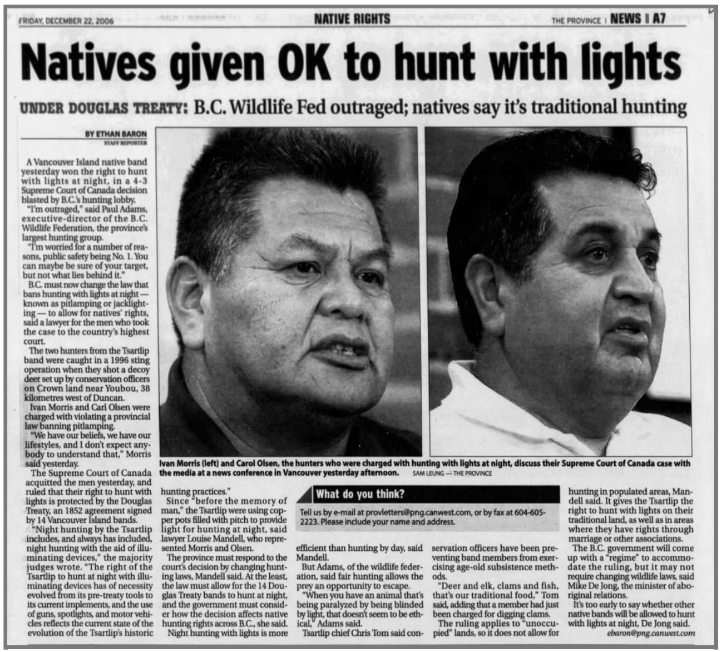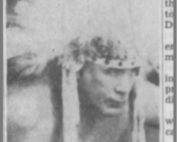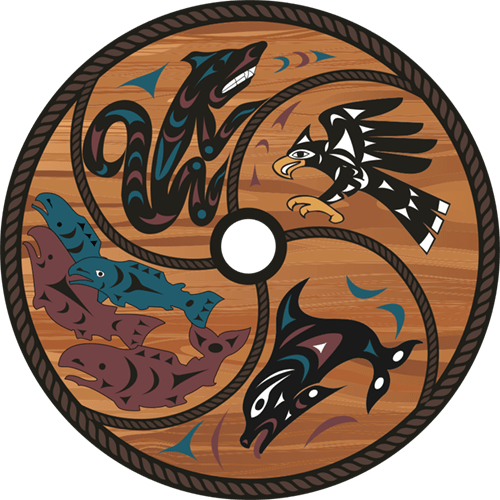
Natives given OK to hunt with lights
UNDER DOUGLAS TREATY: B.C. Wildfire Fed outraged; natives say it’s traditional hunting
[IMAGE]
Ivan Morris (left) and Carol Olsen, the hunters who were charged with hunting with lights at night, discuss their Supreme Court of Canada case with the media at a news conference in Vancouver yesterday afternoon. SAM LEUNG – THE PROVINCE
BY ETHAN BARON
STAFF REPORTER
A Vancouver Island native band yesterday won the right to hunt with lights at night, in a 4-3 Supreme Court of Canada decision blasted by B.C.’s hunting lobby.
“I’m outraged,” said Paul Adams, executive-director of the B.C. Wildlife Federation, the province’s largest hunting group.
“I’m worried for a number of reasons, public safety being No. 1. You can maybe be sure of your target, but not what lies behind it.”
B.C. must now change the law that bans hunting with lights at night – known as pitlamping or jacklighting – to allow for natives’ rights, said a lawyer for the men who took the case to the country’s highest court.
The two hunters from the Tsartlip band were caught in a 1996 sting operation when they shot a decoy deer set up by conservation officers on Crown land near Youbou, 38 kilometres west of Duncan.
Ivan Morris and Carl Olsen were charged with violating a provincial law banning pitlamping.
“We have our beliefs, we have our lifestyles, and I don’t expect anybody to understand that,” Morris said yesterday.
The Supreme Court of Canada acquitted the men yesterday, and ruled that their right to hunt with lights is protected by the Douglas Treaty, an 1852 agreement signed by 14 Vancouver Island bands.
“Night hunting by the Tsartlip includes, and always has included, night hunting with the aid of illuminating devices,” the majority judges wrote. “The right of the Tsartlip to hunt at night with illuminating devices has of necessity evolved from its pre-treaty tools to its current implements, and the use of guns, spotlights, and motor vehicles reflects the current state of the evolution of the Tsartlip’s historic hunting practices.”
Since “before the memory of man,” the Tsartlip were using copper pots filled with pitch to provide light for hunting at night, said lawyer Louise Mandell, who represented Morris and Olsen.
The province must respond to the court’s decision by changing hunting laws, Mandell said. At the least, the law must allow for the 14 Douglas Treaty bands to hunt at night, and the government must consider how the decision affects native hunting rights across B.C., she said.
Night hunting with lights is more efficient than hunting by day, said Mandell.
But Adams, of the wildlife federation, said fair hunting allows the prey an opportunity to escape.
“When you have an animal that’s being paralyzed by being blinded by light, that doesn’t seem to be ethical,” Adams said.
Tsartlip Chief Chris Tom said conservation officers have been preventing band members from exercising age-old subsistence methods.
“Deer and elk, clams and fish, that’s our traditional food,” Tom said, adding that a member had just been charged for digging clams.
The ruling applies to “unoccupied” lands, so it does not allow for hunting in populated areas, Mandell said. It gives the Tsartlip the right to hunt with lights on their traditional land, as well as in areas where they have rights through marriage or other associations.
The B.C. government will come up with a “regime” to accommodate the ruling, but it may not require changing wildlife laws, said Mike De Jong, the minister of aboriginal relations.
It’s too early to say whether other native bands will be allowed to hunt with lights at night, De Jong said.






